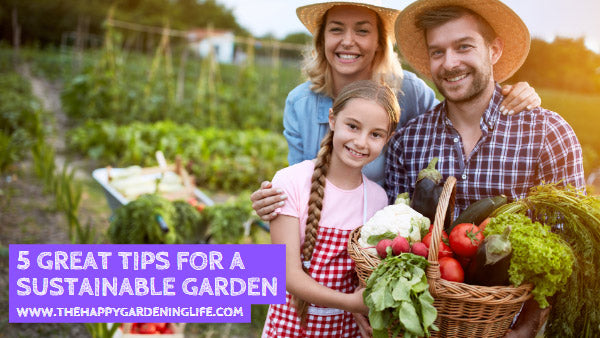
5 Great Tips for a Sustainable Garden
Share
 While sustainable gardening is very doable, it does takes a lot of patience and practice in order to truly succeed in it. You might have to deal with some frustration and disappointment along the way, but you should not let these drawbacks discourage you from gardening.
While sustainable gardening is very doable, it does takes a lot of patience and practice in order to truly succeed in it. You might have to deal with some frustration and disappointment along the way, but you should not let these drawbacks discourage you from gardening.
Making mistakes in gardening is a good way to improve your skills. When you learn well from your failures, you can prevent those problems in the future and you’ll have a much easier time growing your garden.
So what are some of the most useful tips to help you start a successful sustainable garden? Since there’s quite a long list of gardening tips online, we will narrow it down to the 5 best tips just for you.
Check out these practical tips from Mother Earth News for more information.
Want to share this blog post online? Click the social buttons on this page now!
How to Achieve a Sustainable Garden
1. Go organic. Eliminate chemicals from your yard and garden. Organic fertilizers last a lot longer and won’t cause lawn, flower or veggie burn like a chemical fertilizer will. Many chemicals to get rid of bugs these days are “systemic” and stay in the plant for months and even years and kill the bees and other beneficial insects.
2. Save seeds. Growing from seed saves you money, allows you to grown interesting varieties, and raise crops that are uniquely adapted to your garden conditions. You can get seeds by saving your own, your neighbors, favorites from the farmers market, and even from the produce and fruits you buy at the grocer.
3. Grow your own food. You can easily add fruits and veggies to your existing flower gardens. You can easily expand your garden beds to accommodate herbs and veggies. If you don’t have room for a flower and veggie garden bed, you can grown anything in a self watering pot. There has been a bonanza of new container varieties developed over the last few years. It is easy to grow and eat from the garden spring, summer and fall.
4. Compost. Don’t throw those table scraps in the trash to just go sit in a landfill someplace. Re-use their nutritional value in your garden by composting them. There are basically three types of composters: a bin that you layer browns/greens and it takes a year to break down, a tumbler type that you throw the browns/greens together and crank daily to mix up giving you compost in a couple of weeks, and an electric type that can be used indoors or outdoors that gives you compost in a couple of days.
5. Plant perennials. Annuals take a great deal of inputs to grow from seed each year. With perennials, you get the benefit of the inputs for years and years versus just one. Don’t forget about perennial edibles, too! Herbs are a great beginners choice.
Article Source: motherearthnews.com
